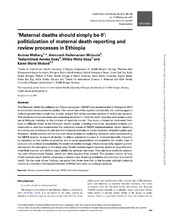| dc.contributor.author | Melberg, Andrea | en_US |
| dc.contributor.author | Mirkuzie, Alemnesh Hailemariam | en_US |
| dc.contributor.author | Sisay, Tesfamichael Awoke | en_US |
| dc.contributor.author | Sisay, Mitike Molla | en_US |
| dc.contributor.author | Moland, Karen Marie | en_US |
| dc.date.accessioned | 2020-04-08T11:23:46Z | |
| dc.date.available | 2020-04-08T11:23:46Z | |
| dc.date.issued | 2019-07-31 | |
| dc.Published | Melberg A, Mirkuzie AH, Sisay, Sisay MM, Moland KM. 'Maternal deaths should simply be 0': Politicization of maternal death reporting and review processes in Ethiopia. Health Policy and Planning. 2019;34(7):492-498 | eng |
| dc.identifier.issn | 0268-1080 | |
| dc.identifier.issn | 1460-2237 | |
| dc.identifier.uri | https://hdl.handle.net/1956/21834 | |
| dc.description.abstract | The Maternal Death Surveillance and Response system (MDSR) was implemented in Ethiopia in 2013 to record and review maternal deaths. The overall aim of the system is to identify and address gaps in order to prevent future death but, to date, around 10% of the expected number of deaths are reported. This article examines practices and reasoning involved in maternal death reporting and review practices in Ethiopia, building on the concept of ‘practical norms’. The study is based on multi-sited fieldwork at different levels of the Ethiopian health system including interviews, document analysis and observations, and has documented the politicized nature of MDSR implementation. Death reporting and review are challenged by the fact that maternal mortality is a main indicator of health system performance. Health workers and bureaucrats strive to balance conflicting demands when implementing the MDSR system: to report all deaths; to deliver perceived success in maternal mortality reduction by reporting as few deaths as possible; and to avoid personalized accountability for deaths. Fear of personal and political accountability for maternal deaths strongly influences not only reporting practices but also the care given in the study sites. Health workers report maternal deaths in ways that minimize their number and deflect responsibility for adverse outcomes. They attribute deaths to community and infrastructural factors, which are often beyond their control. The practical norms of how health workers report deaths perpetuate a skewed way of seeing problems and solutions in maternal health. On the basis of our findings, we argue that closer attention to the broader political context is needed to understand the implementation of MDSR and other surveillance systems. | en_US |
| dc.language.iso | eng | eng |
| dc.publisher | Oxford University Press | eng |
| dc.rights | Attribution CC BY | eng |
| dc.rights.uri | http://creativecommons.org/licenses/by/4.0/ | eng |
| dc.subject | Ethiopia | eng |
| dc.subject | maternal health | eng |
| dc.subject | indicators | eng |
| dc.subject | MDSR | eng |
| dc.subject | multi-sited ethnography | eng |
| dc.title | 'Maternal deaths should simply be 0': Politicization of maternal death reporting and review processes in Ethiopia | en_US |
| dc.type | Peer reviewed | |
| dc.type | Journal article | |
| dc.date.updated | 2020-01-22T11:18:04Z | |
| dc.description.version | publishedVersion | en_US |
| dc.rights.holder | Copyright 2019 The Author(s) | |
| dc.identifier.doi | https://doi.org/10.1093/heapol/czz075 | |
| dc.identifier.cristin | 1746981 | |
| dc.source.journal | Health Policy and Planning | |

